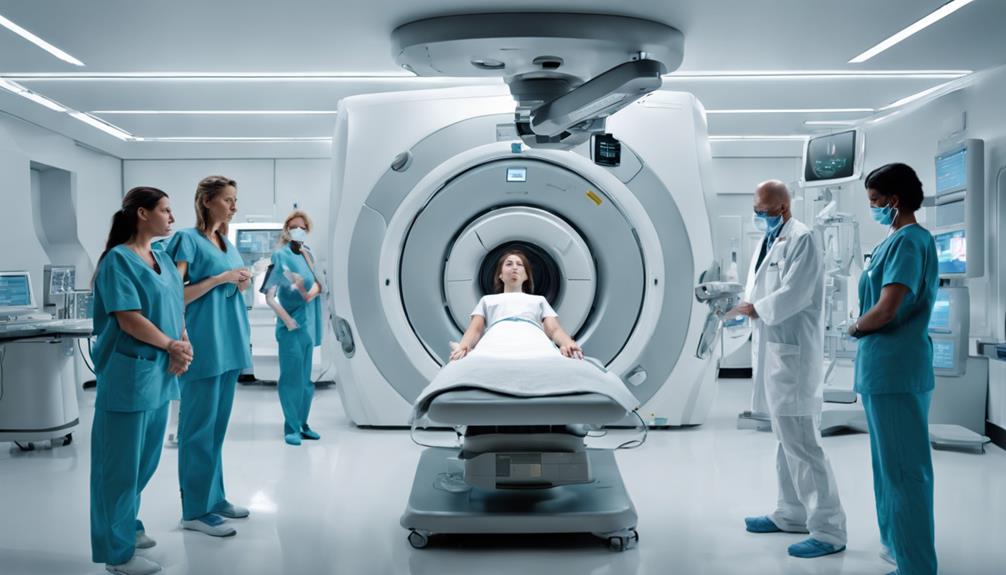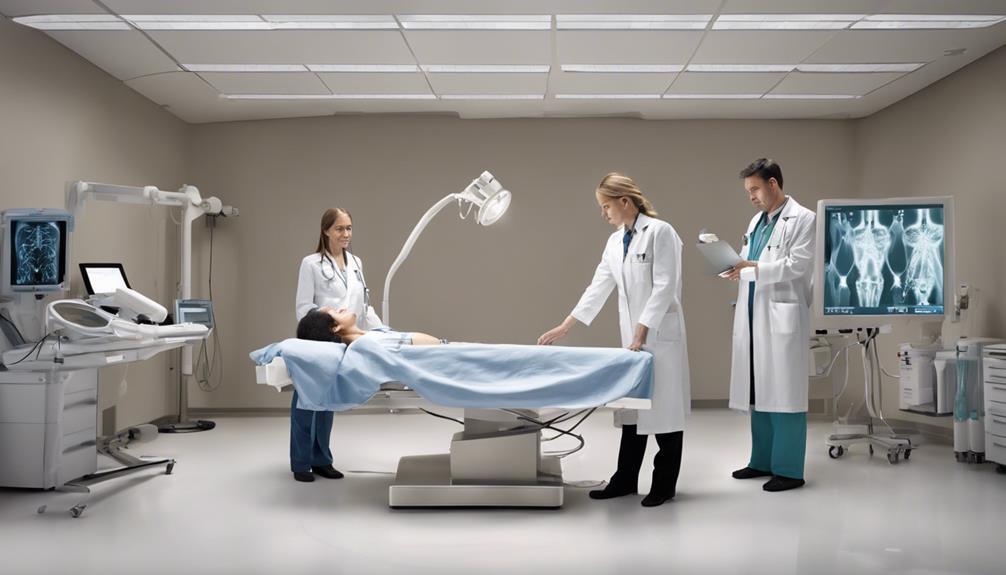When it comes to understanding what a body screening involves, many individuals may not realize the intricacies of the process beyond the basic concept.
The world of body screenings explores fascinating details about the technologies used, the types of tests available, and the significance of preparation.
As we investigate the ins and outs of body screenings, we uncover a domain where early detection and preventative care play a pivotal role in maintaining overall health.
Let's unravel the layers of information surrounding this essential aspect of healthcare together.
Key Takeaways
- Body screenings involve non-invasive imaging tests like CT scans and MRIs.
- They detect potential health concerns early for timely intervention.
- Screenings are essential for managing health effectively and empowering individuals.
- Preparation includes fasting, dietary adjustments, and following specific instructions for accurate results.

Baby Swings for Infants, Monamii Baby Swing, Infant Swing with 5 Speeds, 10 Lullabies, Electric Swing for Baby, Indoor & Outdoor Use (Beige)
BABY SWINGS FOR INFANTS -- Our electric baby swing quickly calms and relaxes your baby with 5 natural...
As an affiliate, we earn on qualifying purchases.
Importance of Body Screenings
Body screenings play an important role in proactively identifying potential health concerns before symptoms manifest, enabling timely intervention and improved treatment outcomes. Early detection is crucial when it comes to managing health issues effectively. By undergoing regular screening tests, individuals can catch any abnormalities early on, leading to better treatment outcomes.
These screenings are especially essential for high-risk populations, as they help in pinpointing specific diseases that individuals may be predisposed to. Preventive healthcare is heavily reliant on these screenings, as they allow healthcare providers to offer personalized recommendations based on individual risk factors.
Understanding the importance of early detection through screenings can make a significant difference in one's overall health and well-being. By staying proactive and keeping up with recommended screenings, individuals can take charge of their health and address any potential issues before they escalate.

Baby Swings for Infants, Portable Baby Swing for Newborns with Bluetooth, Electric Infant Swing with 5 Speed Motions, 12 Soothing Melodies & Remote Control (Max 20 lbs, Orange)
【Soothing Multi-Speed Swing & Bluetooth Music】Our electric baby swing comforts fussy babies with 5 gentle sway speeds, and...
As an affiliate, we earn on qualifying purchases.
Types of Body Screening Tests

Moving from understanding the importance of early detection through screenings, let's explore a variety of tests used in body screenings to assess different aspects of one's health. Body screening tests encompass a range of techniques, including imaging methods like CT scans, MRI scans, and X-rays for detailed evaluations of various body structures. Specific screenings such as mammography, colonoscopy, and Pap smears are instrumental in the early detection of breast, colon, and cervical cancers, respectively. Blood tests play a crucial role in assessing different health parameters, with screenings for cholesterol levels, PSA levels, and blood sugar aiding in the evaluation of cardiovascular health, prostate health, and diabetes risk. Moreover, dental cone-beam CT scans provide detailed 3D images for assessing dental and maxillofacial conditions. These screenings are vital in detecting potential health issues in asymptomatic individuals, guiding further diagnostic evaluations and treatment.
| Screening Test | Purpose | Health Aspect Assessed |
|---|---|---|
| CT scans | Detailed imaging of body structures | Structural health |
| MRI scans | Detailed imaging for various health conditions | Overall health status |
| X-rays | Imaging for bone and lung conditions | Bone and lung health |

LAREX Baby Swing Infant Swing Electric Toddler Baby Rocker Portable for Newborn Boy Girl, 5 Sway Speeds with Remote Control, 10 Preset Melodies and Bluetooth, 0-6 Months Max 20 Lbs (Black)
5 Swing Speeds: The gentle side-to-side motion simulates the feeling of being held by mom, with 5 speed...
As an affiliate, we earn on qualifying purchases.
Preparation for Body Screenings

Preparation for body screenings typically involves specific instructions regarding fasting, dietary restrictions, and removal of metal objects or jewelry before the procedure. To guarantee a successful screening experience, here are some key points to contemplate:
- Fasting Requirements: Certain screenings, such as a CT scan for cancer screening, may necessitate fasting for a period of time before the test. This helps in obtaining accurate results and is essential for the effectiveness of the procedure.
- Dietary Restrictions and Medication Adjustments: In some cases, patients may need to adhere to specific dietary restrictions or make adjustments to their medication schedule before a body screening. This is essential for both the accuracy of the results and the patient's overall health during the process.
- Removal of Metal Objects and Jewelry: Prior to certain imaging tests that involve radiation exposure, patients are usually advised to eliminate any metal objects or jewelry. This precaution is vital to avoid interference with the imaging process and to safeguard the safety and quality of the screening.

Graco Soothe My Way with Removable Rocker, Madden - Versatile Baby Swing & Portable Rocker
Equipped with 8 soothing motions: Providing 16 ways to comfort
As an affiliate, we earn on qualifying purchases.
Procedure During Body Screenings

When undergoing body screenings, patients are guided through the process of imaging techniques like CT scans and MRIs to examine internal structures for abnormalities. These screenings play an important role in early detection by providing detailed images of organs and tissues, helping healthcare providers identify anomalies such as cancer or enlarged organs. The procedure is non-invasive, making it comfortable and painless for individuals. A typical whole-body screening usually takes around 20 minutes to complete, offering a thorough evaluation of the body's internal health. Patients do not need to follow any specific preparation guidelines before the screening, adding to the convenience of the process.
| Benefits of Body Screenings | |
|---|---|
| 1. Early Detection | 2. Identifying Anomalies |
| 3. Detecting Cancer | 4. Non-invasive Procedure |
| 5. Examining Internal Structures |
Benefits of Body Screenings

Body screenings offer a proactive approach to healthcare by detecting potential health issues early and enabling timely intervention for improved outcomes. Here are three key benefits of body screenings:
- Early Detection for Prompt Treatment:
Screening tests play an important role in identifying health issues at an early stage, allowing for timely intervention. This early detection can lead to more effective treatments and better health outcomes.
- Facilitating Lifestyle Changes:
Early detection through screenings empowers individuals to make necessary lifestyle changes that can help reduce the risk of developing serious diseases. By promoting healthier habits, body screenings contribute to long-term prevention strategies.
- Overall Well-being and Preventive Healthcare:
Regular body screenings are essential for preventive healthcare, contributing to the maintenance of overall well-being. Following healthcare provider recommendations based on individual risk factors ensures that screenings are tailored to specific needs, optimizing health management and quality of life. By prioritizing preventive care, individuals can proactively address potential health issues and enhance their overall wellness.
Frequently Asked Questions
What Does a Full Body Scan Include?
A full body scan typically includes imaging of the brain, chest, abdomen, pelvis, and extremities. It may involve CT or MRI scans to provide detailed views of organs, tissues, and structures. Results help assess overall health.
Is It Worth Getting a Full Body Scan?
Getting a full body scan may seem beneficial, but consult experts first. Risks like unnecessary treatments and anxiety can outweigh benefits. Remember, personalized consultation with healthcare providers is key in making informed decisions.
What Tests Are Done for Full Body Scan?
We undergo full-body scans using CT or MRI imaging. These tests help detect conditions like lung cancer, aortic aneurysms, kidney stones, and more. CT scans use radiation, while MRI scans use magnetic fields and radio waves.
Why Would a Doctor Order a Full Body Scan?
We would order a full-body scan if specific conditions or risk factors warrant it. Evaluating and monitoring certain health issues is key. Speaking with healthcare providers is vital to determining the necessity of such scans.
Conclusion
To summarize, the significance of body screenings can't be understated. They offer valuable insights into our health and aid in early detection of potential issues. By undergoing regular screenings, we can take proactive steps towards maintaining our well-being.
Stay tuned for our next article where we explore further into the benefits of specific body screening tests and how they can impact our overall health. Remember, knowledge is power when it comes to taking care of our bodies.









